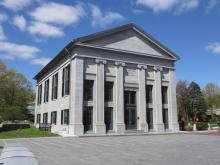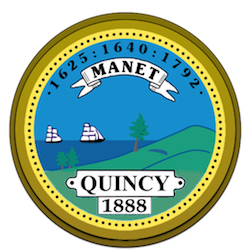
Fast, affordable Internet access for all.

Quincy, Massachusetts, recently let the public know that they're serious about encouraging local Internet access competition through public investment. At an October 21st press conference, Mayor Thomas Koch and City Council Member Ian Cain announced that the largest city in Norfolk County will begin gathering data on local interest in a municipal Fiber-to-the-Home (FTTH) network.
The Choice That Isn't a Choice
With Comcast as the only option for broadband Internet access, leaders such as Cain feel that it's time to encourage competition. DSL is available, but the average speed in the Quincy area is slower than 10 Megabits per second (Mbps) download. Upload speeds are likely around 1 Mbps -- hardly the kind of connectivity a community of 94,000 want to boast about.
Limited fiber for commercial subscribers has been deployed in the city, but without more options, Quincy faces a disadvantage as communities around them invest in better connectivity. The Mayor, Cain, and other local leaders have economic development on their minds when considering the initiative. Cain told press conference attendees, "This is a way to really have Quincy stand out in a way that other cities and towns aren't really looking at. This is a way to put us up front," as a way to attract more businesses.
Cain noted that comments from constituents regarding poor Internet access in Quincy have come to his office for the past five years. In 2018, the city council adopted Cain's resolution to investigate the possibility of publicly owned Internet network infrastructure. Residents have also taken their complaints to the Mayor. At the press conference, Koch said:
“I hear constantly from people about lack of competition – some related to cable, some related to slowness of access to get onto the network. This is something we’re very serious about looking at.”
 In order to determine the community's interest in a publicly owned municipal network, Quincy has launched a survey at qunicyfiber.com and will ask residents to complete survey questions about the potential project as part of the 2020 census. Residents who complete the survey are asked eight questions, including how much they pay for Internet access, what speeds they usually experience, and their experience with Internet access competition in Quincy.
In order to determine the community's interest in a publicly owned municipal network, Quincy has launched a survey at qunicyfiber.com and will ask residents to complete survey questions about the potential project as part of the 2020 census. Residents who complete the survey are asked eight questions, including how much they pay for Internet access, what speeds they usually experience, and their experience with Internet access competition in Quincy.
At the press conference, Cain said that the results of the survey will likely influence how the city structures financing for the project and the areas where the city will initially deploy, if they decide to move forward. Cain also noted that Quincy residents should expect to wait at least a year before the community will see action to develop the network such as construction, due to the complexity of the project.
Spreading the Information
In order to better education the public about why the city is considering the investment, Quincy has created quincyfiber.com, which provides information on the model community leaders are considering. The city has not yet gathered cost estimates, but has expressed an interest in an open access model and has referred to Ammon, Idaho's award-winning fiber optic infrastructure. Quincy has consulted with EntryPoint Networks, which helped develop the network in Ammon.
“What this project is really doing is separating the infrastructure from the services. We’re going to look at providing a city municipally owned utility, in the form of fiber/broadband, and allowing for different companies, Internet service providers, to compete on that network, which will offer competition and eventually to bring the price down,” Cain said.
They've produced this explainer video explaining and describes the potential benefits and options:
Just the Beginning
The next step will be a resolution at the next city council meeting to establish a broadband committee. The committee would take the steps needed to commence a feasibility study and business model. At this stage, city leaders want to know what residents think about the idea of a municipal network and want people to complete the survey. “This is really a constituent and resident-driven process," Cain said.
Watch the press conference:
Image of Historic Quincy Town Hall by Antony-22 [CC BY-SA 4.0]
